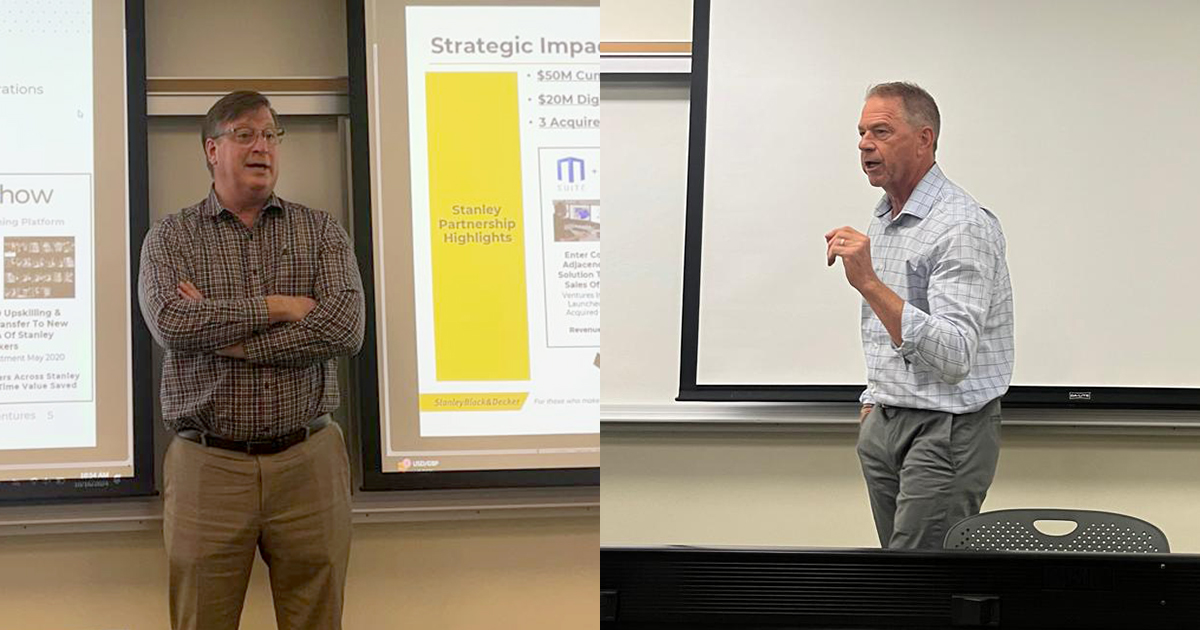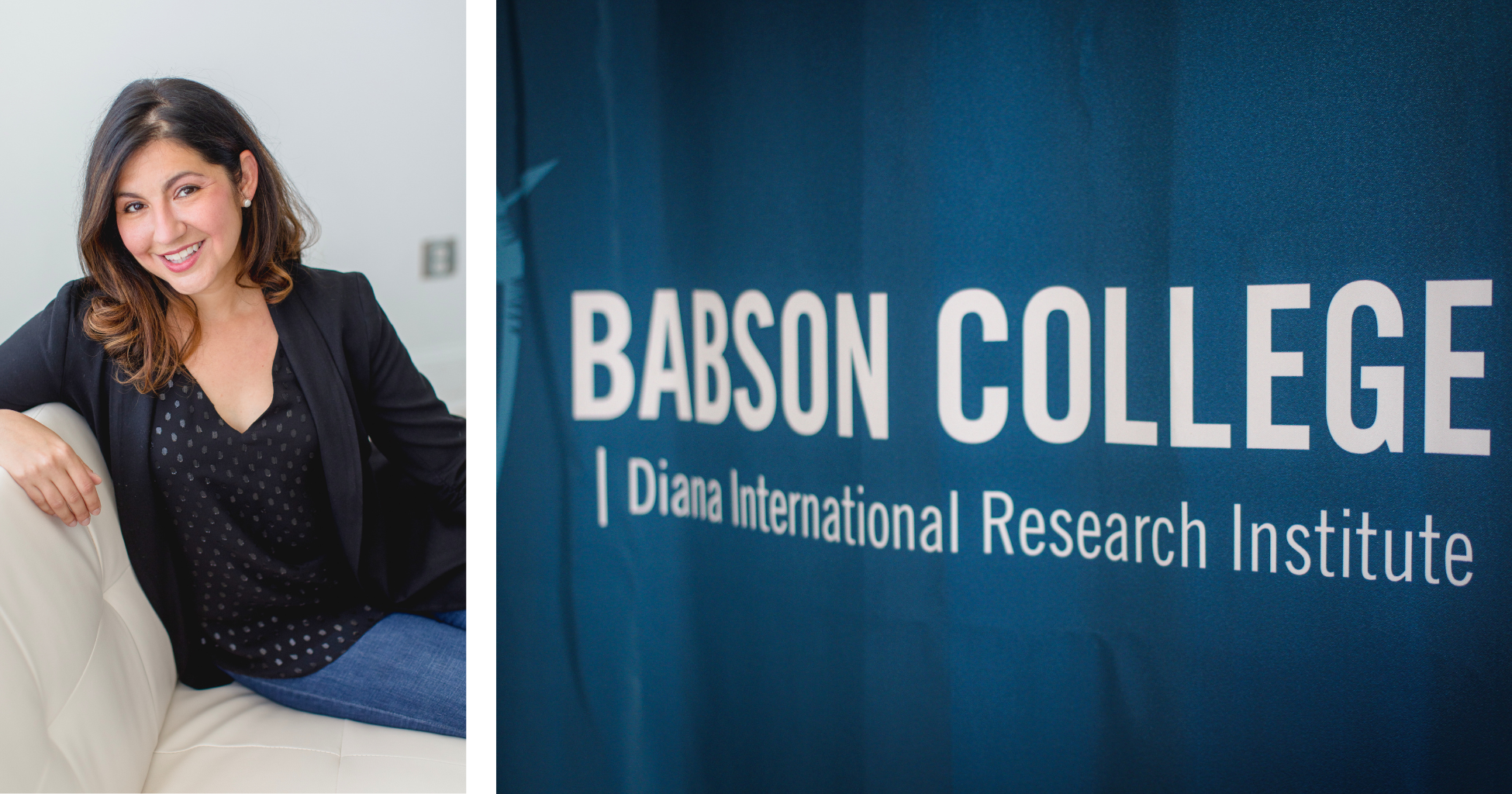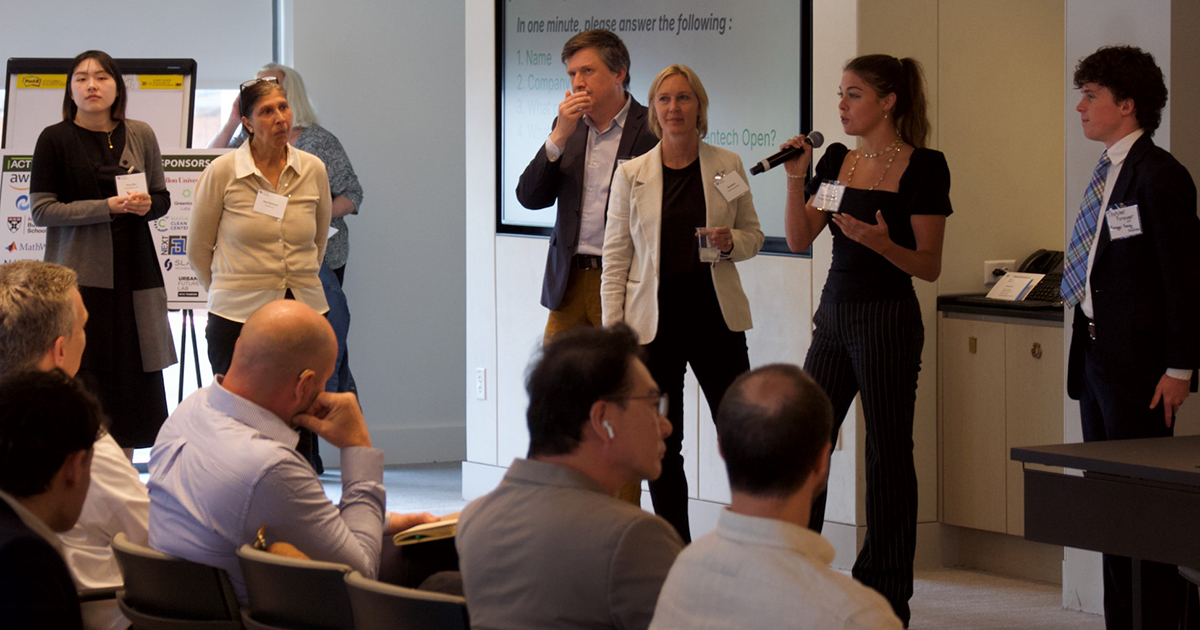Marty Guay and John Bullock on Navigating the Entrepreneurial and Investment Landscapes

Editor’s note: The New Tech Ventures Blog is produced by students in the New Technology Ventures course, taught by Assistant Professor of Practice Stephen Brand. The course features tech leaders and entrepreneurs as weekly guest speakers, and students are sharing their insights on the ventures and the experience. This post was written by the team of Josh Crawford ’25, Felipe McCoy ’25, and Manav Verma ’24.
In our last New Tech Ventures class, we had the privilege of learning from Marty Guay, vice president of business development at Stanley Black and Decker, and John Bullock, a seasoned venture capitalist and managing partner of Windspeed Ventures. Their combined insights on entrepreneurship, investment strategies, business relationships, and business development left us with a wealth of knowledge.
Guay and Bullock are a testament to innovation, adaptability, and strategic vision, offering invaluable insights into what it takes to succeed in today’s competitive business. Together, their insights underscored that success lies in staying true to your vision, fostering meaningful relationships, and continuously driving innovation—principles that resonate with anyone striving to build a successful business in today’s fast-paced world.
Here’s a recap of the key takeaways from their session:
Connecting with the Right People and Strategic Pivoting
Guay began the visit by showing us his approach to business development, which is, as he put it, connecting entrepreneurs with the people they need to succeed. He noted that innovation is not just about invention but about commercialization and scaling. Guay’s strategy emphasizes that building the right connections can drive growth and innovation, encouraging us to actively network with people passionate about what we love. Guay also shared insights on the importance of strategic pivoting and innovation, strongly advising against chasing opportunities without a clear strategy. He further emphasized the importance of basing pivots on internal observations rather than external/market pressure, not changing direction for one customer and staying true to the company’s vision.
Seek Innovation Not Just Returns
Guay also taught us that corporate venture capital isn’t purely about making money but instead about building valuable connections in the industry and being part of the disrupters. This is different from traditional venture capital, which is return motivated. He cautioned that focusing on short-term profits can prevent you from taking the necessary risks to become a market leader, prompting us to focus on creating value and change in the industry we operate in, while developing relationships and maintaining relationships.
Building Resilience and Experience
Guay’s advice for building resilience and experience resonated deeply. He encouraged us to participate in everything, from demo days to mentorship programs, and emphasized that creating more experience than peers is key to staying ahead, encouraging us to ask for extra work, take the extra credit, or run the extra mile. His principle of “work as hard as possible” reflects the dedication needed to succeed in a competitive landscape, mirroring the proactive entrepreneurial mindset we are taught here at Babson.
The Importance of Knowing Your Customer
Both Guay and Bullock emphasized the importance of understanding the customer. Guay noted that despite being a consumer-focused company, Stanley Black and Decker doesn’t have direct access to end-user data. This gap underscored the need for effective data collection and analysis to better serve the customer base, reinforcing that a deep understanding of the end user is pivotal in driving product innovation and customer satisfaction. Guay shared a fundamental principle: Simplicity is the only thing you can scale, that complex problems often require complex solutions, but the ability to simplify and streamline processes is crucial for growth. He used an analogy of using an iPhone without a manual to illustrate the power of intuitive design and user-friendly solutions, highlighting his idea that simplifying complexity can unlock scalability and broader adoption.
Embracing Change and Leveraging Parallel Industries
Bullock described his early career pivots and the importance of embracing change, exploring different industries, and learning new technologies to drive innovation and success. Bullock illustrated that adaptability and exploration can create remarkable opportunities in unexpected places, encouraging us to act. One thing Bullock repeatedly mentioned was the value of networking. Bullock highlighted that networking is not just about who you know but who knows you, stressing the importance of building a strong network. This lesson underlines how proactive relationship-building can be a cornerstone of entrepreneurial success, encouraging us to meet new people we have shared interests with.
Controlling Chaos in Investments
Bullock also shared valuable insights on controlling chaos in investments. He discussed the importance of understanding your portfolio, identifying where to allocate resources, and recognizing “dogs” in the investment landscape. Bullock further warned about the pitfalls of familiarity and fatigue in investments. Getting too familiar with entrepreneurs can lead to ignoring red flags, while fatigue can cause us to overlook valuable assets within a struggling company. He emphasized the importance of staying vigilant and making decisions based on intellect rather than how we feel. Bullock emphasized that in venture capital you invest in the entrepreneur, and the importance of setting boundaries. Noting how past CEOs he has invested in have violated this line causing his portfolios to be damaged, he reminded us that maintaining objectivity and setting boundaries in our relationships is crucial in the business world, as personal connections can sometimes cloud our judgment.
Nurturing the Whale and Scaling
A major lesson from Bullock’s session was the concept of finding and nurturing the “whale”—a company with unique qualities and massive potential. Vistaprint was a standout example of a whale, where innovative printing techniques and strategic planning led to tremendous success. Bullock stressed the need for discipline and the ability to pivot as essential traits for any successful CEO. He told us that scaling from innovation to commercialization is the toughest hurdle for any business, no matter how good the product is. He stressed that entrepreneurs need to stay focused on their core business, saying “no” to opportunities that don’t align, even if they seem tempting in the short term. When you create a business that has a good strategy, opportunities will come to you. Bullock stated that we must perfect our core business and customer experience, if we want to seek funding, to build a business so compelling that opportunities come to us.
Curb Appeal
Guay’s advice about doing as much as possible and focusing on having “curb appeal” resonated with us deeply. He stressed the importance of actively working on something meaningful, and this struck a chord because I’ve been navigating the pressure of planning my path after college “balancing the need to build specific skills while also wanting varied experiences to stand out.” He shared a valuable insight on the importance of saying no to certain opportunities and focusing on your customers in the early stages of a venture. Many of our peers want to create our own ventures, and as most of them fail, it was reassuring to hear from someone like Guay, who has entrepreneurial experience in the corporate world, tell us that we should prioritize having an ongoing, tangible project. He strongly advised us to do as much as possible and emphasized the importance of working on our own projects. As someone highly successful in the corporate world, his guidance to actively engage in meaningful work and have something to show for it is both inspiring and practical, especially when navigating the pressure we face when choosing a concentration or establishing a career path. As an aspiring entrepreneur, his advice really resonated with us—delivering exceptional value to your target audience is essential.
Make Opportunities Chase You
The idea of occasionally saying no was especially interesting, as we often overlook it. By prioritizing quality and impact, we reach a point where opportunities come to us, the type of mentality that we will apply to our ventures. Marty’s conversation on networking was also very insightful. My experience this year applying to jobs has taught us how important meeting people is and setting a good first impression. The business world is mainly connections and getting out of my comfort zone and asking a stranger about their experiences or for a recommendation has helped us learn more about networking and how building relationships is extremely important.
Conclusion
Guay and Bullock’s session was packed with insights on navigating the entrepreneurial and investment landscapes. From embracing change and networking to controlling chaos and strategic pivoting, their experiences provide a robust framework for success. Their advice on finding unique opportunities, building resilience, and understanding the customer offers valuable lessons for entrepreneurs and business leaders alike. The insights from Guay and Bullock emphasize that entrepreneurship is a journey filled with pivots and learning experiences, and the right approach can turn obstacles into stepping stones toward success.
Posted in New Tech Ventures Blog





